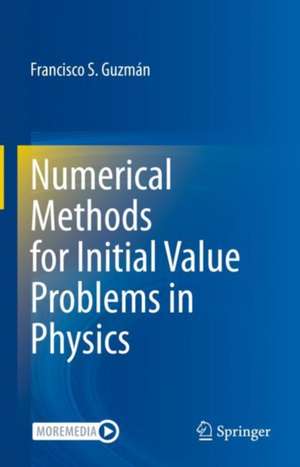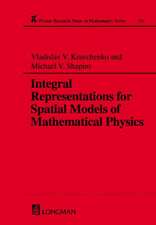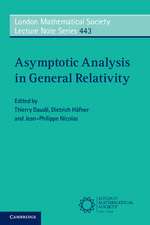Numerical Methods for Initial Value Problems in Physics
Autor Francisco S. Guzmánen Limba Engleză Hardback – 24 aug 2023
The numerical methods selected in this textbook can solve a considerable variety of problems and the applications presented cover a wide range of topics, including population dynamics, chaos, celestial mechanics, geophysics, astrophysics, and more. Each chapter contains a variety of solved problems and exercises, with code included. These examples are designed to motivate and inspire readers to delve deeper into the state-of-the-art problems in their own fields. The code is written in Fortran 90, in a library-free style, making them easy to program and efficient to run. The appendix also includes the same code in C++, making the book accessible to a variety of programming backgrounds.
At the end of each chapter, there are brief descriptions of how the methods could be improved, along with one or two projects that can be developed with the methods and codes described. These projects are highly engaging, from synchronization of chaos and message encryption to gravitational waves emitted by a binary system and non-linear absorption of a scalar field. With its clear explanations, hands-on approach, and practical examples, this textbook is an essential resource for advanced undergraduate and graduate students who want to the learn how to use numerical methods to tackle challenging problems.
Preț: 650.37 lei
Preț vechi: 765.14 lei
-15% Nou
Puncte Express: 976
Preț estimativ în valută:
124.45€ • 128.59$ • 103.53£
124.45€ • 128.59$ • 103.53£
Carte tipărită la comandă
Livrare economică 19 martie-02 aprilie
Preluare comenzi: 021 569.72.76
Specificații
ISBN-13: 9783031335556
ISBN-10: 3031335554
Ilustrații: XIV, 357 p. 130 illus., 9 illus. in color. With online files/update.
Dimensiuni: 155 x 235 mm
Greutate: 0.69 kg
Ediția:1st ed. 2023
Editura: Springer Nature Switzerland
Colecția Springer
Locul publicării:Cham, Switzerland
ISBN-10: 3031335554
Ilustrații: XIV, 357 p. 130 illus., 9 illus. in color. With online files/update.
Dimensiuni: 155 x 235 mm
Greutate: 0.69 kg
Ediția:1st ed. 2023
Editura: Springer Nature Switzerland
Colecția Springer
Locul publicării:Cham, Switzerland
Cuprins
Chapter1. Introduction.- Chapter2. Ordinary Differential Equations.- Chapter3. Simple Methods for Initial Value Problems Involving PDEs.- Chapter4. Method of Lines for Initial Value Problems Involving PDEs.- Chapter5. Finite Volume Methods.- Chapter6. Initial Value Problems in 3+1 and 2+1 dimensions.- Chapter7. Appendix A: Stability of Evolution Schemes.- Chapter8. Appendix B: Codes.
Notă biografică
Dr. Francisco S. Guzmán serves as a Professor for the Institute of Physics and Mathematics at Universidad Michoacana de San Nicolás de Hidalgo in Morelia, Mexico. In 2000, he received his PhD in Physics from The Center for Research and Advanced Studies of the National Polytechnic Institute (CINVESTAV) in Mexico City, Mexico. His research interest lies in the numerical solutions of partial differential equations, with applications to hydrodynamics, plasmas, Bose-Einstein condensates, complex fluids, diffusion systems, and populations. He has directed 18 undergraduate, 11 masters, and 6 doctoral theses, one of which was the winner of the 2017 Weizmann Award for Best PhD Thesis in Exact Sciences, a distinction awarded annually by the Mexican Academy of Sciences. Dr. Guzmán has published 108 articles in international journals and conference proceedings, authored 5 book chapters, and received over 2000 citations.
Textul de pe ultima copertă
This textbook is a comprehensive overview of the construction, implementation, and application of important numerical methods for the solution of Initial Value Problems (IVPs). Beginning with IVPs involving Ordinary Differential Equations (ODEs) and progressing to problems with Partial Differential Equations (PDEs) in 1+1 and 3+1 dimensions, it provides readers with a clear and systematic progression from simple to complex concepts.
The numerical methods selected in this textbook can solve a considerable variety of problems and the applications presented cover a wide range of topics, including population dynamics, chaos, celestial mechanics, geophysics, astrophysics, and more. Each chapter contains a variety of solved problems and exercises, with code included. These examples are designed to motivate and inspire readers to delve deeper into the state-of-the-art problems in their own fields. The code is written in Fortran 90, in a library-free style, making them easy to program and efficient to run. The appendix also includes the same code in C++, making the book accessible to a variety of programming backgrounds.
At the end of each chapter, there are brief descriptions of how the methods could be improved, along with one or two projects that can be developed with the methods and codes described. These projects are highly engaging, from synchronization of chaos and message encryption to gravitational waves emitted by a binary system and non-linear absorption of a scalar field. With its clear explanations, hands-on approach, and practical examples, this textbook is an essential resource for advanced undergraduate and graduate students who want to the learn how to use numerical methods to tackle challenging problems.
The numerical methods selected in this textbook can solve a considerable variety of problems and the applications presented cover a wide range of topics, including population dynamics, chaos, celestial mechanics, geophysics, astrophysics, and more. Each chapter contains a variety of solved problems and exercises, with code included. These examples are designed to motivate and inspire readers to delve deeper into the state-of-the-art problems in their own fields. The code is written in Fortran 90, in a library-free style, making them easy to program and efficient to run. The appendix also includes the same code in C++, making the book accessible to a variety of programming backgrounds.
At the end of each chapter, there are brief descriptions of how the methods could be improved, along with one or two projects that can be developed with the methods and codes described. These projects are highly engaging, from synchronization of chaos and message encryption to gravitational waves emitted by a binary system and non-linear absorption of a scalar field. With its clear explanations, hands-on approach, and practical examples, this textbook is an essential resource for advanced undergraduate and graduate students who want to the learn how to use numerical methods to tackle challenging problems.
Caracteristici
Covers a wide range of numerical methods and applications Provides code in Fortran and C++ for readers to implement Each chapter contains solved problems, exercises, and projects
























